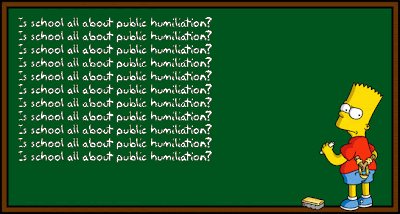I spent the last three weeks trying to come back from my "blogging - and blog reading - break" with some huge, seemingly essential, post, but I don't think I needed the pressure. So I return, as schools restart, with a small issue, but one that helps to defeat many students... Sorry for being gone, glad to be back...
A long time ago, in one of my undergraduate university experiences (and there were many attempts before success), I took a Creative Writing course. For the most part the course was wonderful - it put me on the path that led to The Drool Room and more, and I still have friends I met there (hey Joe), but the first day of that course remains fixed in my mind in a special way.
"Everyone come up to the board," the instructor announced, "and write a good title for a short story." I stayed in my seat. I would rather, among people I'm meeting for the first time, be naked than have my handwriting be observed and analysed. And that's not because I'm an exhibitionist. It's because of the assumptions which people immediately make: "Oh, I have a three-year old brother who writes just like that." "Are you trying to be funny? What language is that?" "What's wrong with you?" "What are you, dyslexic or something?"
It's because of the assumptions which people immediately make: "Oh, I have a three-year old brother who writes just like that." "Are you trying to be funny? What language is that?" "What's wrong with you?" "What are you, dyslexic or something?"
That class instructor pointed to me where I sat. "Come on, everybody up," he said. Now I had a choice: sullen weirdo or retard. So I went up to the board, I wrote an "X" (X is a "good letter" - like O) and sat back down. I claimed I wanted to write about someone unknowable. I think I momentarily pulled it off, but I was angry, frustrated, and ready to leave and drop the course.
As this semester began I assigned some brief excerpts as reading for my course in "Special Education Students in the Regular Education Classroom." One of those excerpts was from Learning Disabilities and Life Stories (Pano Rodis, Andrew Garrod, Mary Lynn Boscardin - 2001), and part of that excerpt included this former LD student discussing taking a "high-stakes test":
"It felt like an eternity before I heard the word Stop! What a great relief! I would relax into my chair and start to feel better. As I brought my head up, my red-rimmed eyes met Chrissy Watson's. She sat at her desk, upright and proper, with her hands on her lap, her pencil positioned approximately four inches from the top of her desk. Her test booklet centered on the desk top just two inches below her pencil. Her answers right there in perfect sight, displayed so that the whole class could see. Her little black circles looked as if they had been printed with a laser printer. My test booklet was wrinkled and worn looking, except for the pages that I never got to. Big black smudges streaked my answer sheet and some spots I had erased so much that the print was coming off. I had to turn my booklet over so that no one could see. My pencil was worn to a dull point, and during the test, l had bitten down on the other end to maximize my erasing ability. I would put my head down on my desk pretending to be bored so that I could cover my booklet until the teacher collected them. As l lay there trying to give the other kids the impression that the test had simply bored me to death, panic was beginning to build. Who would be collecting the tests? Would it be the teacher or one of her pets? Probably Chrissy."
What is funny about this is that the very same teachers who might be extremely sensitive to humiliations in physical education or on the playground ("just because I'm not good at sport shouldn't be a reason to be humiliated by being picked last, or laughed at") seem most oblivious to the everyday humiliations of struggling students in school. But those humiliations push students away from school, away from learning, and away from opportunity - and they are often pushed away long before they reach the age of eight.
So next time you look at the students in your room, and ask for an activity, consider this: Think about being in front of a room full of your peers, people you must see everyday, and being forced to do whatever you are absolutely worst at - singing opera, painting with oils, dancing ballet, doing gymnastics - in front of everyone. Now imagine them all laughing at you, and judging you worthless.
Then re-think your classroom environment. Please.
- Ira Socol







No comments:
Post a Comment